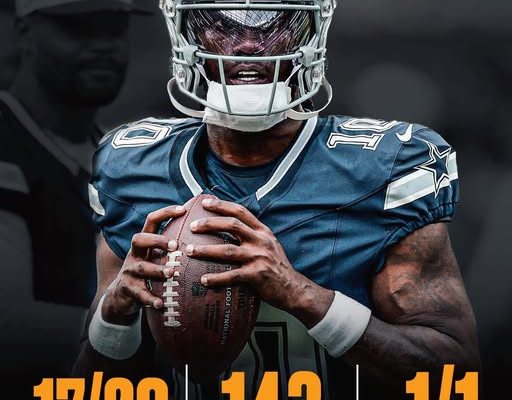The Dallas Cowboys kicked off their 2025 preseason with high hopes, eager to showcase the depth and talent that could push them toward a successful regular season. However, the spotlight during the opening game quickly fell on one player in particular: quarterback Joe Milton. Making his Dallas preseason debut, Milton’s performance left much to be desired, and his own candid self-assessment underscored the struggles he faced on the field. The young quarterback openly graded himself a D or D-minus, acknowledging that nerves and early jitters played a significant role in his shaky outing. Despite grappling with an elbow injury, Milton remained optimistic about his physical condition, stating that with some morning treatment, he’d be ready to bounce back. His honest reflections offer a revealing glimpse into the mindset of a player striving to prove himself in the unforgiving environment of NFL football.
Joe Milton’s journey to this point has been marked by perseverance and determination. As a quarterback trying to carve out a role on a team with a competitive roster, every snap in the preseason carries immense weight. For Milton, the preseason game in Dallas was an opportunity to demonstrate growth, command of the offense, and resilience under pressure. Unfortunately, the reality of the game exposed some of the areas where he needs to improve. The very nerves and urgency that fuel a player’s drive to succeed can sometimes become obstacles, as Milton himself noted when he said he needed to “settle down early.” This admission highlights the mental aspect of quarterback play—calm decision-making and confidence are just as important as physical talent.
The performance also unfolded against the backdrop of Milton managing an elbow injury. Injuries are an ever-present concern in football, and quarterbacks often have to navigate the delicate balance between playing through pain and maintaining peak performance. Milton’s approach to his elbow issue appeared measured and realistic. He conveyed confidence in his recovery process, indicating that morning treatments would help him feel better and keep him ready to compete. This attitude is critical for any player hoping to secure a spot on the roster and contribute during the regular season. It also speaks to Milton’s professionalism and understanding of what it takes to sustain a career in the NFL.
Critically analyzing Milton’s preseason performance requires recognizing the intense level of competition within the Cowboys’ quarterback room. The team boasts talent at the position, and every player must consistently demonstrate readiness and improvement. Milton’s struggles were evident in his timing, decision-making, and perhaps a hesitance that stemmed from the pressure of proving himself. Such challenges are not uncommon for young quarterbacks adjusting to the speed and complexity of the NFL game. Coaches and analysts often emphasize that preseason games are learning experiences, where mistakes are expected and growth is measured over time.
Milton’s self-assigned D or D-minus grade is unusually candid for a player in the public eye, especially one eager to impress coaches and fans alike. This level of honesty reflects a maturity and self-awareness that could serve him well in the long run. Acknowledging shortcomings openly is a critical first step toward improvement. It also indicates that Milton is not making excuses but rather taking responsibility for his performance. This mindset aligns with the culture of accountability that the Cowboys and many NFL teams strive to foster.
Looking ahead, the key question is how Milton will respond to this early setback. The preseason is designed to test players’ resilience and capacity for growth. For Milton, settling down early in games and maintaining composure will be paramount. It’s one thing to recognize the need for improvement, but turning that recognition into actionable progress is what distinguishes successful players. Coaches will likely focus on helping Milton develop his confidence, refine his mechanics, and better read defenses to reduce costly errors.
Milton’s comments about his elbow injury also deserve further attention. Playing through injury is part of the professional athlete’s reality, but it carries risks. The Cowboys’ medical and coaching staff will have to carefully monitor Milton’s condition to ensure it does not hamper his development or lead to more serious issues. At the same time, Milton’s positive outlook suggests he’s mentally prepared to push through adversity. This toughness can be a valuable asset as he competes for a roster spot and aims to make an impact.
Fans and analysts will be watching closely as Milton continues his preseason journey. Quarterbacks often face a steep learning curve, especially when adjusting to a new team’s system or recovering from injuries. The mental aspect—managing pressure, staying calm under duress, and making quick, accurate decisions—is frequently the greatest hurdle. Milton’s admission that he needs to “settle down early” hints at a recognition that controlling nerves and composure is essential to unlocking his potential.
The broader context of the Cowboys’ season ambitions adds another layer of significance to Milton’s performance. The team is aiming to build on previous successes and contend for a playoff spot. Depth at quarterback is crucial, particularly in a physically demanding sport where injuries can strike unexpectedly. Milton’s ability to learn from his preseason debut and elevate his play could prove vital in ensuring the Cowboys have reliable options at the position throughout the season.
In addition to technical and physical factors, the emotional and psychological aspects of Milton’s situation warrant consideration. Making a preseason debut with a new team, under the watchful eyes of coaches, teammates, and fans, is a pressure cooker moment. The fact that Milton graded himself harshly shows a high personal standard and desire to meet expectations. Balancing this internal drive with patience and self-compassion will be important as he navigates the ups and downs of professional football.
Milton’s story is also emblematic of the larger narrative facing many young quarterbacks trying to establish themselves in the NFL. The path to success is rarely linear. Setbacks and struggles are inevitable, but how a player responds can define their career. Milton’s openness about his performance and injury status provides a transparent starting point for that journey. It invites supporters to appreciate not only the raw talent but the hard work and resilience behind the scenes.
As the preseason progresses, all eyes will remain on Milton to see how he applies the lessons learned from his Dallas debut. Will he be able to channel his frustrations into focused improvement? Can he manage the physical demands of his injury while continuing to develop his skill set? These questions will shape the narrative around his role on the Cowboys moving forward.
In conclusion, Joe Milton’s candid self-assessment after a difficult Dallas preseason debut reveals much about the challenges facing young quarterbacks in the NFL. His acknowledgment of needing to settle down early and his measured approach to managing an elbow injury demonstrate both humility and determination. While the performance fell short of expectations, it also marked a crucial learning experience and a test of character. With the right support and mindset, Milton has the opportunity to grow from this moment and contribute meaningfully to the Cowboys’ season goals. The journey will demand patience, resilience, and continuous effort — qualities that Milton appears ready to embrace as he navigates the demanding world of professional football.



